Module1 Unit 2 Are they yours课件(共36张PPT)外研版七年级下册
文档属性
| 名称 | Module1 Unit 2 Are they yours课件(共36张PPT)外研版七年级下册 |
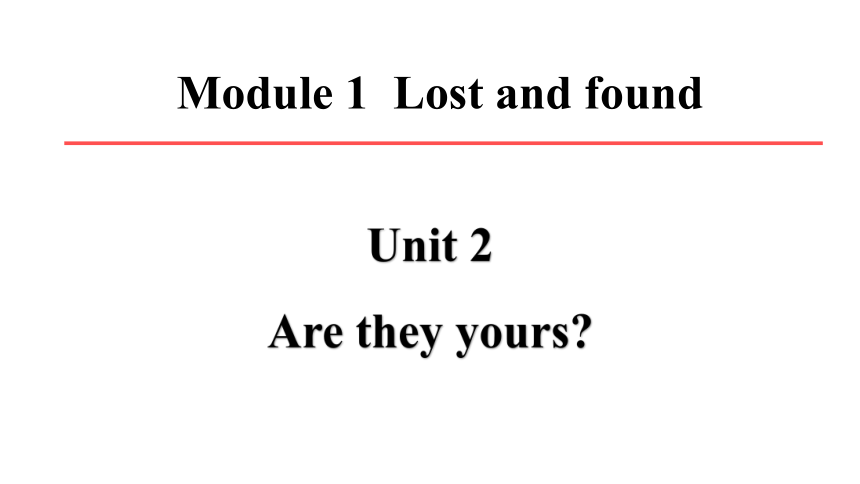
|
|
| 格式 | pptx | ||
| 文件大小 | 13.5MB | ||
| 资源类型 | 教案 | ||
| 版本资源 | 外研版 | ||
| 科目 | 英语 | ||
| 更新时间 | 2024-02-01 00:00:00 | ||
图片预览


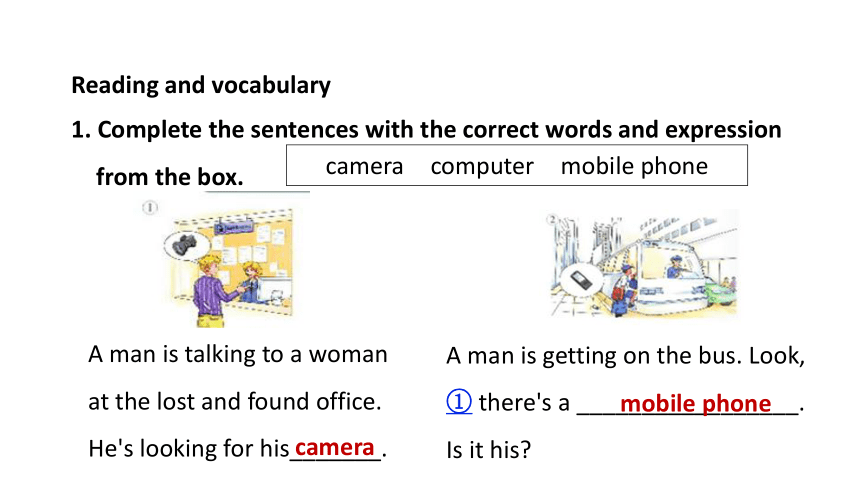
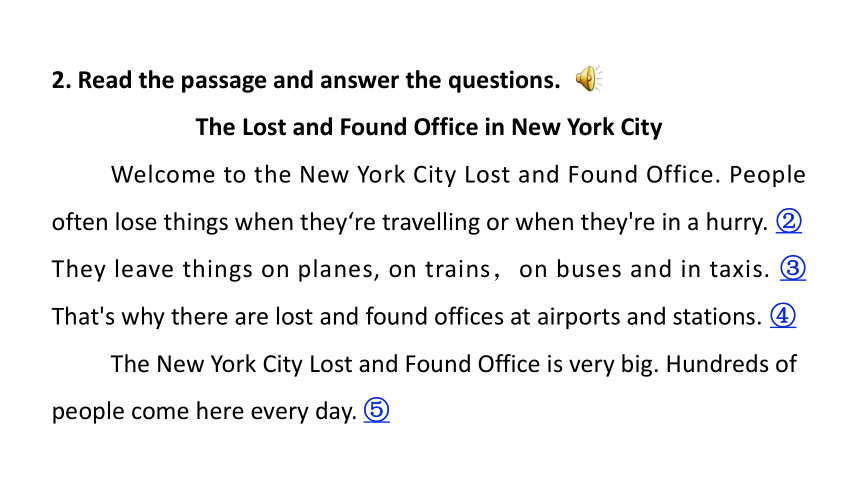
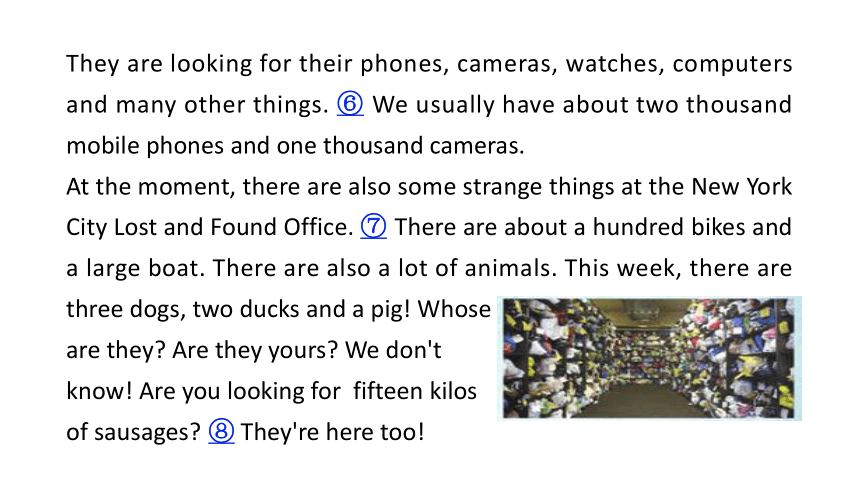
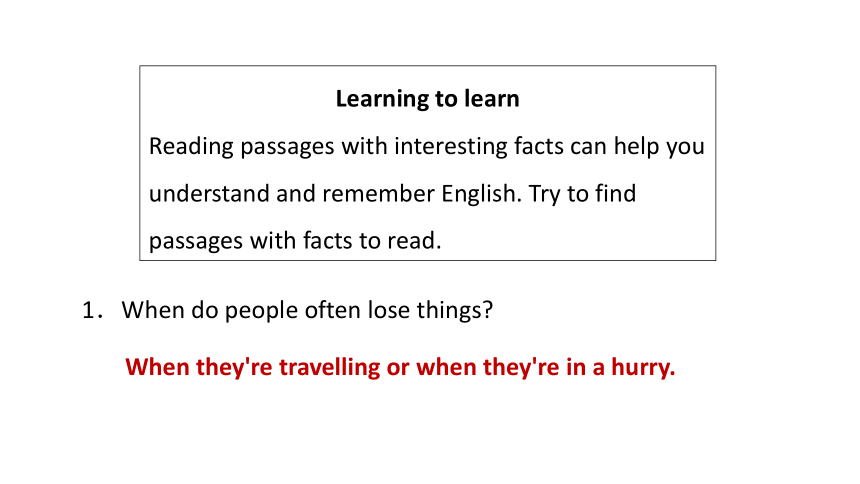
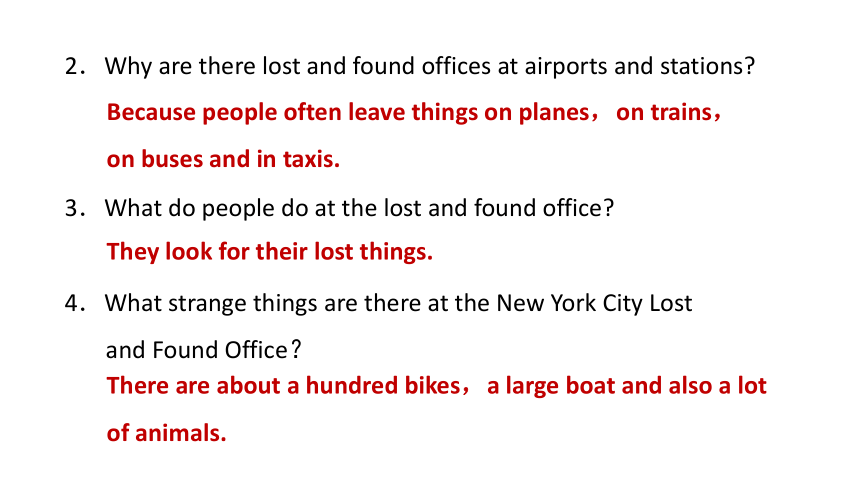
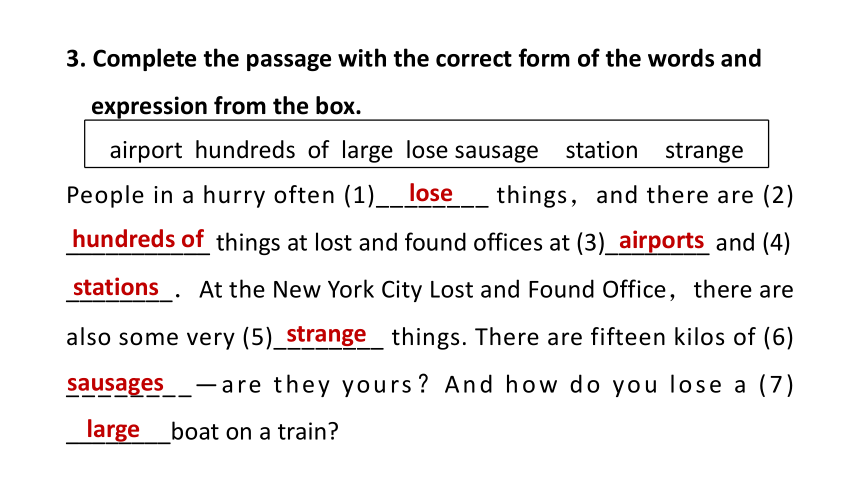
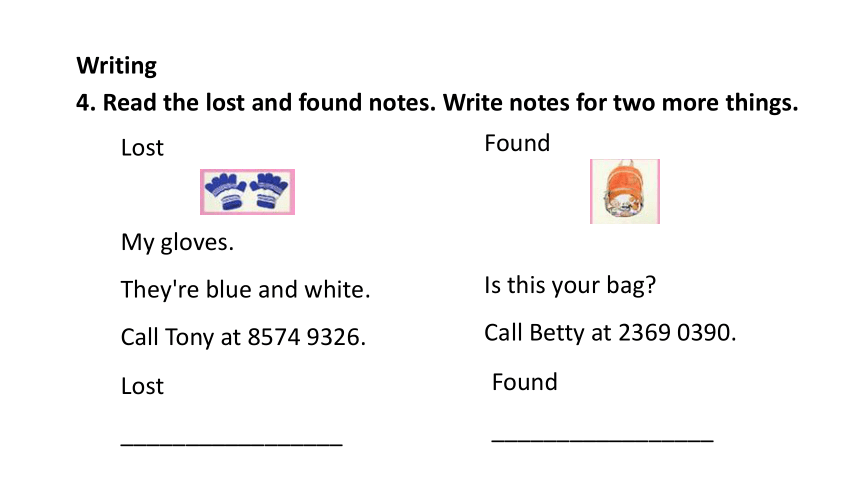
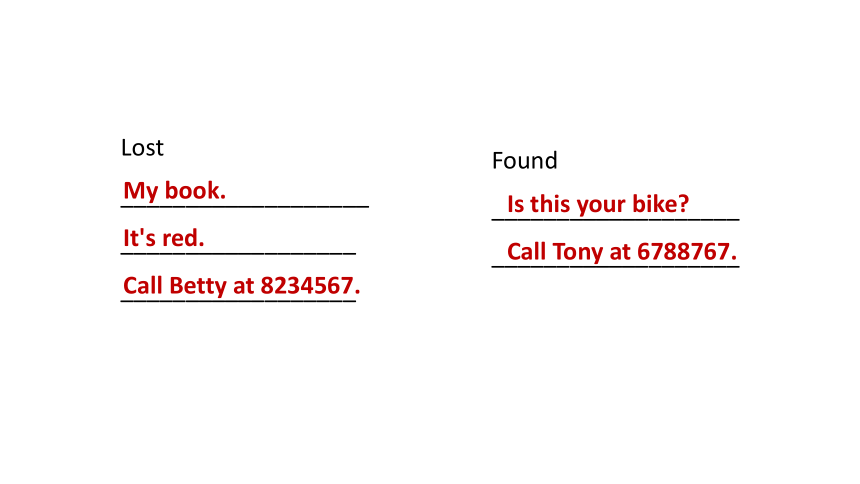
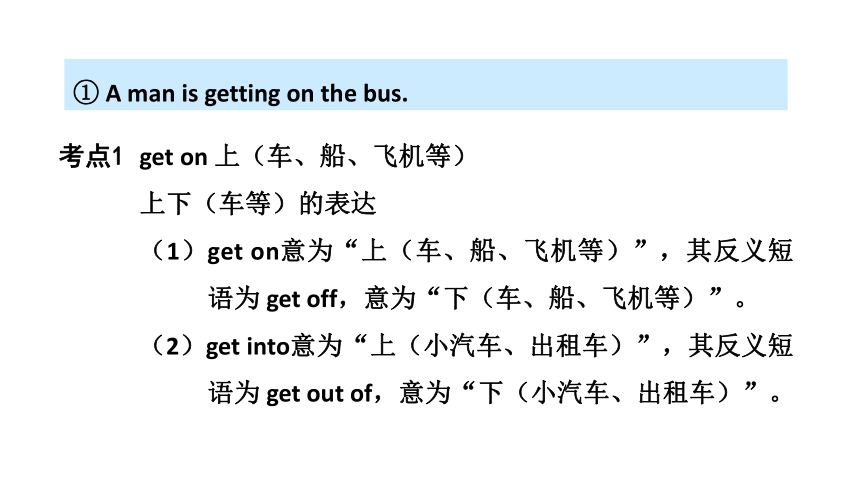
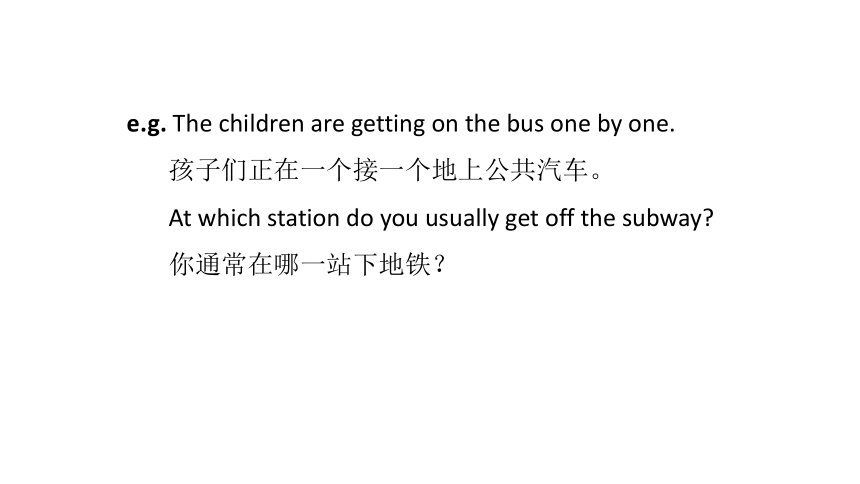
文档简介
(共36张PPT)
Module 1 Lost and found
Unit 2
Are they yours
Discuss: What can we do when we find something somebody else loses
1. Complete the sentences with the correct words and expression from the box.
camera computer mobile phone
Reading and vocabulary
A man is talking to a woman
at the lost and found office. He's looking for his_______.
A man is getting on the bus. Look, ① there's a _________________.
Is it his
camera
mobile phone
2. Read the passage and answer the questions.
The Lost and Found Office in New York City
Welcome to the New York City Lost and Found Office. People often lose things when they‘re travelling or when they're in a hurry. ② They leave things on planes, on trains,on buses and in taxis. ③ That's why there are lost and found offices at airports and stations. ④
The New York City Lost and Found Office is very big. Hundreds of people come here every day. ⑤
They are looking for their phones, cameras, watches, computers and many other things. ⑥ We usually have about two thousand mobile phones and one thousand cameras.
At the moment, there are also some strange things at the New York City Lost and Found Office. ⑦ There are about a hundred bikes and a large boat. There are also a lot of animals. This week, there are three dogs, two ducks and a pig! Whose
are they Are they yours We don't
know! Are you looking for fifteen kilos
of sausages ⑧ They're here too!
Learning to learn
Reading passages with interesting facts can help you understand and remember English. Try to find passages with facts to read.
1.When do people often lose things
When they're travelling or when they're in a hurry.
2.Why are there lost and found offices at airports and stations
3.What do people do at the lost and found office
4.What strange things are there at the New York City Lost
and Found Office?
Because people often leave things on planes,on trains,
on buses and in taxis.
They look for their lost things.
There are about a hundred bikes,a large boat and also a lot of animals.
3. Complete the passage with the correct form of the words and expression from the box.
lose
airport hundreds of large lose sausage station strange
People in a hurry often (1)________ things,and there are (2) ___________ things at lost and found offices at (3)________ and (4) ________.At the New York City Lost and Found Office,there are also some very (5)________ things. There are fifteen kilos of (6) ________—are they yours?And how do you lose a (7) ________boat on a train
airports
hundreds of
strange
stations
large
sausages
4. Read the lost and found notes. Write notes for two more things.
Writing
Lost
My gloves.
They're blue and white.
Call Tony at 8574 9326.
Found
Is this your bag
Call Betty at 2369 0390.
Lost
_________________
Found
_________________
Lost
___________________
__________________
__________________
Found
___________________
___________________
My book.
It's red.
Call Betty at 8234567.
Is this your bike
Call Tony at 6788767.
① A man is getting on the bus.
get on 上(车、船、飞机等)
上下(车等)的表达
(1)get on意为“上(车、船、飞机等)”,其反义短语为 get off,意为“下(车、船、飞机等)”。
(2)get into意为“上(小汽车、出租车)”,其反义短语为 get out of,意为“下(小汽车、出租车)”。
考点1
e.g. The children are getting on the bus one by one.
孩子们正在一个接一个地上公共汽车。
At which station do you usually get off the subway
你通常在哪一站下地铁?
考题1: The bus is coming. Oh! It’s full. I’m afraid we can’t _____ it.
A. get up B. get on
C. get off D. get to
【点拨】get up 起床;get on 上(车);get off 下(车);get to 到达。由语境可知此处表示“我们”无法上车了。
B
返回
②People often lose things when they’re travelling or when they’re in a hurry.
in a hurry 匆匆忙忙
考点2
hurry 还可作动词,意为“匆忙,急忙”。
hurry to+ 地点名词 匆忙赶往某地
hurry up 快点,赶紧
hurry to do sth. 匆忙做某事
作名词,意为“匆忙”。
e.g. Don’t be in a hurry when you cross the road.
当你过马路时不要匆匆忙忙。
He goes home in a hurry.
He hurries home. 他匆忙回家。
hurry后接表示地点的副词,则省去 to。
作表语
作状语
考题2:I went to school ________ without breakfast.
A. in no hurry B. no hurry C. in a hurry D. in hurry
C
语境助记:
Tom, wash your face in a hurry! Hurry up! You are going to be late. You must hurry to school! However, don’t hurry to cross the road!
汤姆,快点洗脸!快点!你要迟到了。你必须快点去上学!但是,不要匆忙地过马路!
返回
③ They leave things on planes, on trains, on buses and in taxis.
leave /li v/ v. 丢下;遗忘,其过去式为 left
考点3
leave 表示“遗忘某物”时,常指把某物落在某地了,其后常有地点状语。常用结构:leave sth.+ 地点状语,意为“把某物落在……”。
forget 表示“遗忘某物”时,常指头脑中记不起某物了,其后通常不与表示地点的词连用。
辨析:leave 与forget
leave 用作动词,还可意为“离开”,常用搭配:
leave A 离开A地
leave for B 前往B地
l eave A for B 离开A地去B地
e.g. I left my umbrella at home. 我把雨伞忘在家里了。
He forgot his schoolbag this morning.
他今天上午忘记带书包了。
My father is leaving for Shanghai tomorrow.
我爸爸明天要动身去上海。
She will leave Shanghai for Beijing. 她要离开上海去北京。
考题3:—Alex, why didn’t you answer my call at nine last night
—Sorry, I ______ my mobile phone at home. I ______ basketball in the park with my friends at that time.
A. forgot; played B. forgot; was playing
C. left; played D. left; was playing
D
返回
④That’s why there are lost and found offices at airports and stations.
That’s why...这/那就是为什么……;这/那就是……的原因。
考点4
在该句式中,that 不可换为this,但翻译时,
that 根据语境意为“这”或“那”。
“That’s why...”句型中,why 引导表语从句,从句表述的是某一动作造成的结果。
e.g. Tom is hard-working and helpful. That’s why we should learn from him. 汤姆学习勤奋而且乐于助人。那就是我们应该向他学习的原因。
拓展:that’s because... 意为“那是因为……”,后面跟的句子说明的是原因。
e.g. He can’t understand this article. That’s because he is only a child. 他不能理解这篇文章。那是因为他只是一个孩子。
考题4:[潍坊] You have spent too much time playing computer games. That’s _____ your eyes hurt.
A. why B. how C. what D. when
【点拨】用固定句式法解题。“That’s why...”是固定句式,意为“那就是……的原因”。
A
返回
⑤ Hundreds of people come here every day.
hundreds of 数百;成百上千
e.g. The building is hundreds of years old.
这座建筑有几百年(的历史)了。
There are eight hundred students in our school.
我们学校有800 名学生。
考点5
表示约数 用“hundreds/thousands/millions of+ 可数名词复数”结构。
表示确数 用“ 基数词+hundred/thousand/million+ 可数名词复数”结构。
辨析:约数和确数的表达
考题5: [绥化] There are _____ paintings on exhibition (展览). _____ works were created(创作)by young artists(艺术家).
A. two hundred; Two hundreds
B. two hundreds; Hundreds of
C. hundreds of; Two hundred
【点拨】表示概数,用hundreds + of + 名词复数;表示确切的数量,用基数词 + hundred + 名词复数。结合选项可知,two hundreds 表达错误,故排除A 和B 选项。
C
返回
⑥They are looking for their phones, cameras, watches, computers and many other things.
look for 寻找
e.g. What are you looking for, Jenny
你在找什么,珍妮
考点6
look for “寻找”,指有目的地找,强调“寻找”的过程。
find 强调“寻找”的结果,指“找到;发现”。其过去式为 found。
辨析:look for 与find
一语辨异:I’m looking for my cat everywhere, but I can’t find it.
我正到处寻找我的猫,但是我找不到它。
考题6:[绥化 ] Mum, could you help me ______ my toy car I can’t ______ it anywhere!
A. look for; find B. find; look for C. look; find out
【点拨】look for“ 寻 找”;find“ 发 现;找到”;look
“看”;find out“找出;查明”。由句意可知第一个空格表示“寻找”,第二个空格表示“找到”。
A
返回
⑦At the moment, there are also some strange things at the New York City Lost and Found Office.
at the moment 此刻;现在
e.g. At the moment, I am not hungry. 我现在不饿。
Jim is swimming at the moment. 吉姆此刻正在游泳。
考点7
at the moment相当于now,常用于一般现在时和现在进行时。
考题7:—I can’t find Jimmy. Where is he
—He ______ in the garden at the moment.
A. worked B. will work
C. is working D. was working
【点拨】由 at the moment (目前;此刻)可知此处应用现在进行时。
C
strange /stre nd / adj. 奇怪的
e.g. The place is strange to me.
我对这个地方不熟悉。
You mustn’t wear strange clothes at school.
在学校你(们)禁止穿奇装异服。
A stranger stops her on the way.
路上一个陌生人拦住了她。
考点8
作表语,不熟悉的;陌生的
作定语
strange 的名词形式为
stranger(陌生人)
语境助记:
On my way to school, a strange man followed me. He was strange. I ran away quickly. My mother often tells me not to speak to strangers. 在我上学的路上,一个陌生男人跟着我。他很奇怪。我快速地跑开了。我的妈妈经常告诉我不要和陌生人说话。
返回
⑧ Are you looking for fifteen kilos of sausages
fifteen kilos of... 十五千克的……
e.g. I want one kilo of potatoes and two kilos of meat.
我要一千克土豆和两千克肉。
These potatoes weigh about ten kilos.
这些土豆约重十千克。
Two kilos of sausages are lost.
两千克香肠丢了。
考点9
表示物体重量时,常用“基数词 + 重量单位(+of)”,重量单位的数与前面的基数词保持一致。
考题8:Please help me buy _____ when you go to the supermarket.
A. two kilo apples B. two kilo of apples
C. two kilos of apples D. two kilos apples
【点拨】“数词 + kilo(s) of...”是固定结构,意为“多少千克的……”,当数词大于 1 时,kilo 用复数形式;同时 apple是可数名词,根据语境可知此处应用其复数形式。
C
返回
本节课主要学习了“纽约的失物招领处”这篇文章,掌握了知识点talk to, get on, in a hurry, leave, hundreds of, other, look for的用法,并回答了与文章内容相关的问题,练习了失物招领的写法。
Module 1 Lost and found
Unit 2
Are they yours
Discuss: What can we do when we find something somebody else loses
1. Complete the sentences with the correct words and expression from the box.
camera computer mobile phone
Reading and vocabulary
A man is talking to a woman
at the lost and found office. He's looking for his_______.
A man is getting on the bus. Look, ① there's a _________________.
Is it his
camera
mobile phone
2. Read the passage and answer the questions.
The Lost and Found Office in New York City
Welcome to the New York City Lost and Found Office. People often lose things when they‘re travelling or when they're in a hurry. ② They leave things on planes, on trains,on buses and in taxis. ③ That's why there are lost and found offices at airports and stations. ④
The New York City Lost and Found Office is very big. Hundreds of people come here every day. ⑤
They are looking for their phones, cameras, watches, computers and many other things. ⑥ We usually have about two thousand mobile phones and one thousand cameras.
At the moment, there are also some strange things at the New York City Lost and Found Office. ⑦ There are about a hundred bikes and a large boat. There are also a lot of animals. This week, there are three dogs, two ducks and a pig! Whose
are they Are they yours We don't
know! Are you looking for fifteen kilos
of sausages ⑧ They're here too!
Learning to learn
Reading passages with interesting facts can help you understand and remember English. Try to find passages with facts to read.
1.When do people often lose things
When they're travelling or when they're in a hurry.
2.Why are there lost and found offices at airports and stations
3.What do people do at the lost and found office
4.What strange things are there at the New York City Lost
and Found Office?
Because people often leave things on planes,on trains,
on buses and in taxis.
They look for their lost things.
There are about a hundred bikes,a large boat and also a lot of animals.
3. Complete the passage with the correct form of the words and expression from the box.
lose
airport hundreds of large lose sausage station strange
People in a hurry often (1)________ things,and there are (2) ___________ things at lost and found offices at (3)________ and (4) ________.At the New York City Lost and Found Office,there are also some very (5)________ things. There are fifteen kilos of (6) ________—are they yours?And how do you lose a (7) ________boat on a train
airports
hundreds of
strange
stations
large
sausages
4. Read the lost and found notes. Write notes for two more things.
Writing
Lost
My gloves.
They're blue and white.
Call Tony at 8574 9326.
Found
Is this your bag
Call Betty at 2369 0390.
Lost
_________________
Found
_________________
Lost
___________________
__________________
__________________
Found
___________________
___________________
My book.
It's red.
Call Betty at 8234567.
Is this your bike
Call Tony at 6788767.
① A man is getting on the bus.
get on 上(车、船、飞机等)
上下(车等)的表达
(1)get on意为“上(车、船、飞机等)”,其反义短语为 get off,意为“下(车、船、飞机等)”。
(2)get into意为“上(小汽车、出租车)”,其反义短语为 get out of,意为“下(小汽车、出租车)”。
考点1
e.g. The children are getting on the bus one by one.
孩子们正在一个接一个地上公共汽车。
At which station do you usually get off the subway
你通常在哪一站下地铁?
考题1: The bus is coming. Oh! It’s full. I’m afraid we can’t _____ it.
A. get up B. get on
C. get off D. get to
【点拨】get up 起床;get on 上(车);get off 下(车);get to 到达。由语境可知此处表示“我们”无法上车了。
B
返回
②People often lose things when they’re travelling or when they’re in a hurry.
in a hurry 匆匆忙忙
考点2
hurry 还可作动词,意为“匆忙,急忙”。
hurry to+ 地点名词 匆忙赶往某地
hurry up 快点,赶紧
hurry to do sth. 匆忙做某事
作名词,意为“匆忙”。
e.g. Don’t be in a hurry when you cross the road.
当你过马路时不要匆匆忙忙。
He goes home in a hurry.
He hurries home. 他匆忙回家。
hurry后接表示地点的副词,则省去 to。
作表语
作状语
考题2:I went to school ________ without breakfast.
A. in no hurry B. no hurry C. in a hurry D. in hurry
C
语境助记:
Tom, wash your face in a hurry! Hurry up! You are going to be late. You must hurry to school! However, don’t hurry to cross the road!
汤姆,快点洗脸!快点!你要迟到了。你必须快点去上学!但是,不要匆忙地过马路!
返回
③ They leave things on planes, on trains, on buses and in taxis.
leave /li v/ v. 丢下;遗忘,其过去式为 left
考点3
leave 表示“遗忘某物”时,常指把某物落在某地了,其后常有地点状语。常用结构:leave sth.+ 地点状语,意为“把某物落在……”。
forget 表示“遗忘某物”时,常指头脑中记不起某物了,其后通常不与表示地点的词连用。
辨析:leave 与forget
leave 用作动词,还可意为“离开”,常用搭配:
leave A 离开A地
leave for B 前往B地
l eave A for B 离开A地去B地
e.g. I left my umbrella at home. 我把雨伞忘在家里了。
He forgot his schoolbag this morning.
他今天上午忘记带书包了。
My father is leaving for Shanghai tomorrow.
我爸爸明天要动身去上海。
She will leave Shanghai for Beijing. 她要离开上海去北京。
考题3:—Alex, why didn’t you answer my call at nine last night
—Sorry, I ______ my mobile phone at home. I ______ basketball in the park with my friends at that time.
A. forgot; played B. forgot; was playing
C. left; played D. left; was playing
D
返回
④That’s why there are lost and found offices at airports and stations.
That’s why...这/那就是为什么……;这/那就是……的原因。
考点4
在该句式中,that 不可换为this,但翻译时,
that 根据语境意为“这”或“那”。
“That’s why...”句型中,why 引导表语从句,从句表述的是某一动作造成的结果。
e.g. Tom is hard-working and helpful. That’s why we should learn from him. 汤姆学习勤奋而且乐于助人。那就是我们应该向他学习的原因。
拓展:that’s because... 意为“那是因为……”,后面跟的句子说明的是原因。
e.g. He can’t understand this article. That’s because he is only a child. 他不能理解这篇文章。那是因为他只是一个孩子。
考题4:[潍坊] You have spent too much time playing computer games. That’s _____ your eyes hurt.
A. why B. how C. what D. when
【点拨】用固定句式法解题。“That’s why...”是固定句式,意为“那就是……的原因”。
A
返回
⑤ Hundreds of people come here every day.
hundreds of 数百;成百上千
e.g. The building is hundreds of years old.
这座建筑有几百年(的历史)了。
There are eight hundred students in our school.
我们学校有800 名学生。
考点5
表示约数 用“hundreds/thousands/millions of+ 可数名词复数”结构。
表示确数 用“ 基数词+hundred/thousand/million+ 可数名词复数”结构。
辨析:约数和确数的表达
考题5: [绥化] There are _____ paintings on exhibition (展览). _____ works were created(创作)by young artists(艺术家).
A. two hundred; Two hundreds
B. two hundreds; Hundreds of
C. hundreds of; Two hundred
【点拨】表示概数,用hundreds + of + 名词复数;表示确切的数量,用基数词 + hundred + 名词复数。结合选项可知,two hundreds 表达错误,故排除A 和B 选项。
C
返回
⑥They are looking for their phones, cameras, watches, computers and many other things.
look for 寻找
e.g. What are you looking for, Jenny
你在找什么,珍妮
考点6
look for “寻找”,指有目的地找,强调“寻找”的过程。
find 强调“寻找”的结果,指“找到;发现”。其过去式为 found。
辨析:look for 与find
一语辨异:I’m looking for my cat everywhere, but I can’t find it.
我正到处寻找我的猫,但是我找不到它。
考题6:[绥化 ] Mum, could you help me ______ my toy car I can’t ______ it anywhere!
A. look for; find B. find; look for C. look; find out
【点拨】look for“ 寻 找”;find“ 发 现;找到”;look
“看”;find out“找出;查明”。由句意可知第一个空格表示“寻找”,第二个空格表示“找到”。
A
返回
⑦At the moment, there are also some strange things at the New York City Lost and Found Office.
at the moment 此刻;现在
e.g. At the moment, I am not hungry. 我现在不饿。
Jim is swimming at the moment. 吉姆此刻正在游泳。
考点7
at the moment相当于now,常用于一般现在时和现在进行时。
考题7:—I can’t find Jimmy. Where is he
—He ______ in the garden at the moment.
A. worked B. will work
C. is working D. was working
【点拨】由 at the moment (目前;此刻)可知此处应用现在进行时。
C
strange /stre nd / adj. 奇怪的
e.g. The place is strange to me.
我对这个地方不熟悉。
You mustn’t wear strange clothes at school.
在学校你(们)禁止穿奇装异服。
A stranger stops her on the way.
路上一个陌生人拦住了她。
考点8
作表语,不熟悉的;陌生的
作定语
strange 的名词形式为
stranger(陌生人)
语境助记:
On my way to school, a strange man followed me. He was strange. I ran away quickly. My mother often tells me not to speak to strangers. 在我上学的路上,一个陌生男人跟着我。他很奇怪。我快速地跑开了。我的妈妈经常告诉我不要和陌生人说话。
返回
⑧ Are you looking for fifteen kilos of sausages
fifteen kilos of... 十五千克的……
e.g. I want one kilo of potatoes and two kilos of meat.
我要一千克土豆和两千克肉。
These potatoes weigh about ten kilos.
这些土豆约重十千克。
Two kilos of sausages are lost.
两千克香肠丢了。
考点9
表示物体重量时,常用“基数词 + 重量单位(+of)”,重量单位的数与前面的基数词保持一致。
考题8:Please help me buy _____ when you go to the supermarket.
A. two kilo apples B. two kilo of apples
C. two kilos of apples D. two kilos apples
【点拨】“数词 + kilo(s) of...”是固定结构,意为“多少千克的……”,当数词大于 1 时,kilo 用复数形式;同时 apple是可数名词,根据语境可知此处应用其复数形式。
C
返回
本节课主要学习了“纽约的失物招领处”这篇文章,掌握了知识点talk to, get on, in a hurry, leave, hundreds of, other, look for的用法,并回答了与文章内容相关的问题,练习了失物招领的写法。
同课章节目录
- Module 1 Lost and found
- Unit 1 Whose bag is this?
- Unit 2 Are they yours?
- Unit 3 Language in use
- Module 2 What can you do ?
- Unit 1 I can play the piano
- Unit 2 I can run really fast
- Unit 3 Language in use
- Module 3 Making plans
- Unit 1 What are you going to do at the weekends?
- Unit 2 We're going to cheer the players.
- Unit 3 Language in use
- Module 4 Life in the future
- Unit 1 Everyone will study at home
- Unit 2 Every family will have a small plane.
- Unit 3 Language in use
- Module 5 Shopping
- Unit 1 What can I do for you?
- Unit 2 You can buy everything on the Internet
- Unit 3 Language in use
- Module 6 Around town
- Unit 1 Could you tell me how to get to the Nationa
- Unit 2 The London Eye is on your right.
- Unit 3 Language in use
- Revision module A
- Module 7 My past life
- Unit 1 I was born in a small village.
- Unit 2 I was born in Quincy.
- Unit 3 Language in use
- Module 8 Story time
- Unit 1 Once upon a time….
- Unit 2 Goldilocks hurried out of the house.
- Unit 3 Language in use
- Module 9 Life history
- Unit 1 He left school and began work at the age of
- Unit 2 He decided to be an actor.
- Unit 3 Language in use
- Module 10 A holiday journey
- Unit 1 What did you do?
- Unit 2 This morning we took a walk.
- Unit 3 Language in use
- Module 11 Body language
- Unit 1 They touch noses!
- Unit 2 Here are some ways to welcome them.
- Unit 3 Language in use
- Module 12 Western music
- Unit 1 It's so beautiful!
- Unit 2 Vienna is the centre of European classical
- Unit 3 Language in use
- Revision module B
